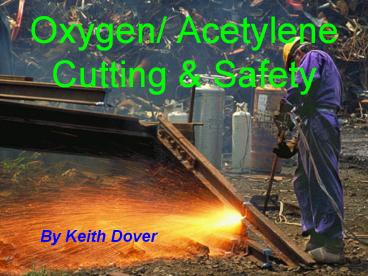Oxygen/ Acetylene Cutting - PowerPoint PPT Presentation
Title:
Oxygen/ Acetylene Cutting
Description:
Oxygen/ Acetylene Cutting & Safety By Keith Dover Cutting Tip Welding Tip Heating Tip Flashback Arrestors Reverse Flow Check Valves Cutting Torch Manufacturers Oxygen ... – PowerPoint PPT presentation
Number of Views:635
Avg rating:3.0/5.0
Title: Oxygen/ Acetylene Cutting
1
Oxygen/ Acetylene Cutting Safety
- By Keith Dover
2
Objectives for the Lesson
- Students will be able to identify terms
associated with oxygen/acetylene cutting. - Students will be able to label and identify parts
of a cutting torch. - Students will be able to list 3 safety
procedures.
3
- Students will be able to identify 3 personal
protective equipment pieces. - Students will also demonstrate how to properly
light torch. - Students will also demonstrate how to shut down
torch.
4
E-moment
- Take out paper and answer the following
questions. - You will have 3 minutes.
- What do you know about oxygen-acetylene cutting
and safety? - What do you think you know about oxygen-acetylene
cutting and safety? - What dont you know yet about oxygen-acetylene
cutting and safety?
5
Pre-Test
- Take out paper and identify the following pieces
of equipment - A. B.
6
C. D.E.
F.
7
G. H. I. J.
8
K. L.
9
Defintions
- Oxygen- (non-flammable gas) Is not a fuel it is
what chemically combines with the fuel to the
heat for cutting. - This is called oxidation.
- Its shipped in high pressure cylinders at
pressures around 2200 lbs/in2
10
- Acetylene-(flammable gas) is the primary fuel
for oxy-acetylene cutting. - Acetylene is shipped in special cylinders
designed to keep the gas dissolved. - The cylinders are packed with porous material,
then filled to 50 capacity with acetone at 250
lbs/in2.
11
Oxygen/Acetylene CuttingSafety Tips
- Keep an approved fire extinguisher of the proper
size and type in the work area. - Inspect it regularly to ensure that it is in
proper working order. - Know how to use the fire extinguisher.
- Never cut on a container that has had toxic,
combustible, or flammable liquids in it.
12
Safety Tips (contiued)
- Never perform cutting operations in an area
containing combustible vapors, flammable liquids,
or explosive dust. - Keep cutting apparatus clean and free from all
grease, oil, and other flammable substances. - Always keep work area well ventilated.
13
Oxygen/Acetylene cutting torches can be used to
cut, pierce and gouge mild steel.
14
Oxygen/Acetylene Cutting Guidelines
15
Oxygen/Acetylene Cutting
- Oxygen/Acetylene cutting operations use fire or
combustion as a basic tool. - The process is very useful when properly
controlled. - However, it can be extremely destructive if not
performed correctly in the proper environment.
16
Oxygen/Fuel Cutting
- Gas flames produce infrared radiation
- This may have a harmful effect on the skin and
especially on the eyes.
17
Oxygen/Acetylene Cutting
- Personal Protective Equipment (PPE)!
- Select goggles or a mask with tempered lenses
- Shaded 5 or darker to protect your eyes from
injury and provide good visibility of the work.
18
- Wear flame resistant clothing, protective
gloves, sleeves, aprons and safety shoes to
protect skin and clothing from sparks and slag. - Keep collars, sleeves and pockets buttoned.
- DO NOT roll up sleeves or cuff pants.
19
Oxygen/Acetylene Cutting
- Good housekeeping practices improve the safety of
any work area. - They are essential to the safety of welding and
cutting operations due to the potential hazards
involved.
20
Oxygen/Acetylene Cutting
- Warning!
- Never allow oxygen to contact grease, oil, or
other flammable substances.
21
- Although oxygen by itself will not burn, these
substances become highly explosive. - They can ignite and burn violently in the
presence of oxygen.
22
Oxygen/Acetylene Cutting
- Ventilate welding and cutting work areas
adequately. - Maintain sufficient air flow
- This will prevent accumulation of explosive or
toxic concentrations of gases.
23
- Welding or cutting operations using certain
combinations of metals, coatings, and gases
generate toxic fumes. - Use respiratory protection equipment in these
circumstances.
24
Cutting Torch Parts
25
Portable Oxygen/ Acetylene Cutting Rig
26
(No Transcript)
27
Pressure Settings for Oxygen Acetylene
Regulators
- Oxygen 20 psi
- Acetylene 7 psi
28
Acetylene Regulator
29
Oxygen Regulator
30
Oxygen/Acetylene Hose
Green Oxygen Red Acetylene
31
Cutting Torch
32
Parts of a Cutting Torch
33
Spark Lighter
34
Cutting Tip
35
Welding Tip
36
Heating Tip
37
Flashback Arrestors
38
Reverse Flow Check Valves
39
Cutting Torch Manufacturers
40
Oxygen/Acetylene Cutting Torch Safety Hazards
41
Working Pressure Gauge Failure
42
Cracked Acetylene Hose
43
Oxygen and Acetylene Cylinders Stored Improperly
Under Stairwell
44
Oxygen/ Acetylene Cutting Torch Stored on Unsafe
Cart
45
Oxygen/ Acetylene Cutting Torch Stored in
Flammable Liquids Cabinet
46
In Conclusion
- This process can KILL you and others. Follow all
safety rules. - Completely shut down the cutting torch when the
job is completed.
47
- Keep all oils and grease away from the
regulators. - When oxygen is compressed with a petrochemical,
it becomes highly reactive and can explode. - Imagine a 500lb bomb exploding in front of you.
- Will there be any pieces to pick up?
48
Post-Test
- Raise your hand if you think you know what these
represent - B.
- Portable
- cutting rig Gauges
49
C. Acetylene D. Oxygen
regulator regulator
E.
F. HosesGreen OxygenRed
Acetylene Spark Lighter
50
Cutting Torch H. Cutting Tip I.
Welding TipJ.
Heating Tip
51
Flashback L. Reverse Flow Arrestors
Check Valves
52
Remember Safety is Job 1































